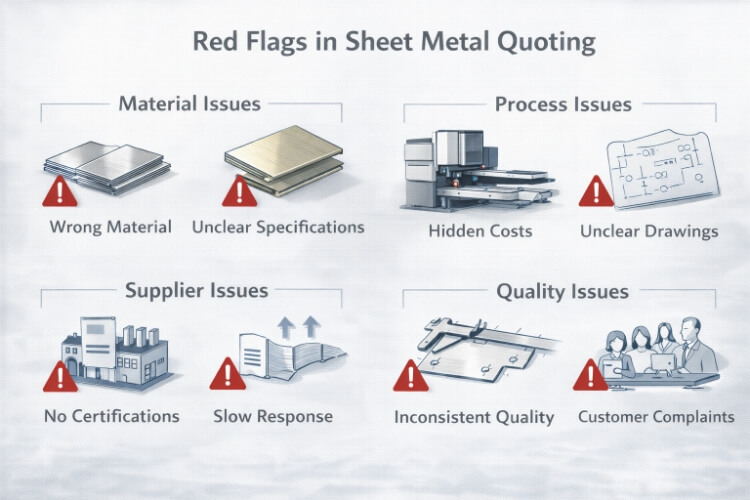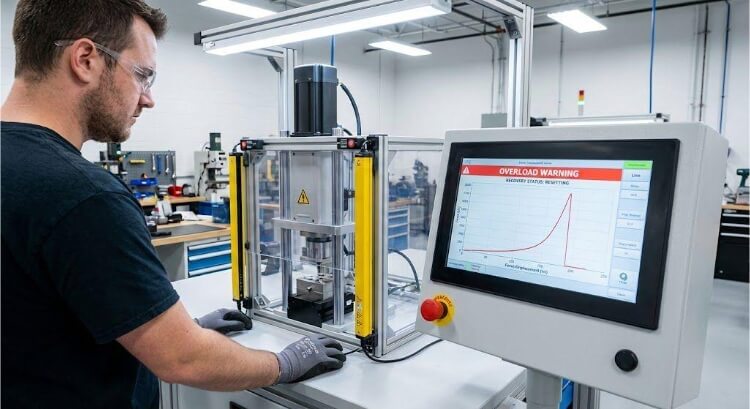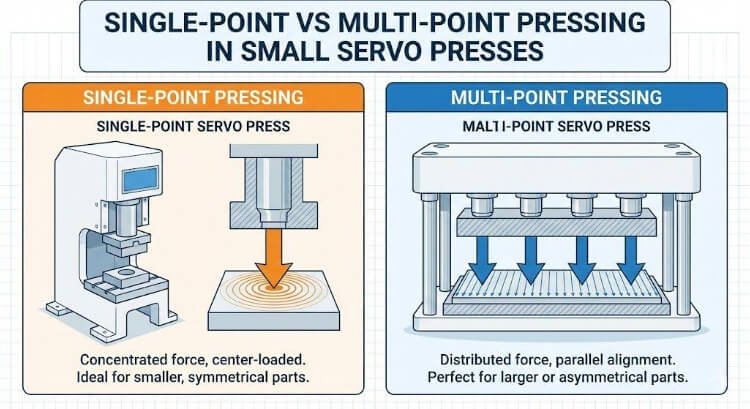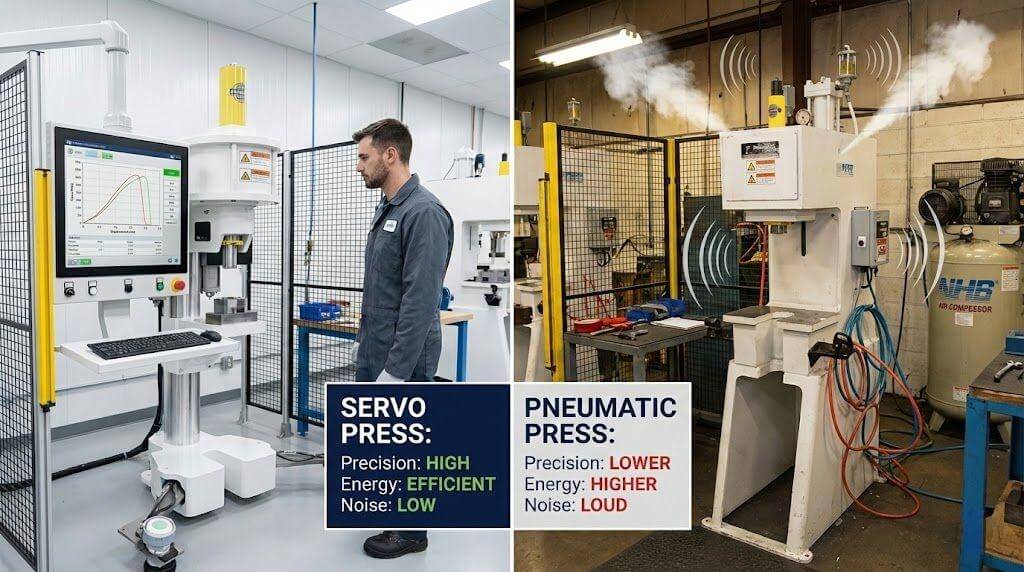Washers might look like simple pieces of hardware, but picking the wrong one can lead to serious issues. You could end up with loose connections, damaged materials, or even a failed assembly. This post covers the main types of washers to help you choose the right one for your project.
Here’s a look at the most common washer types and what each one does.
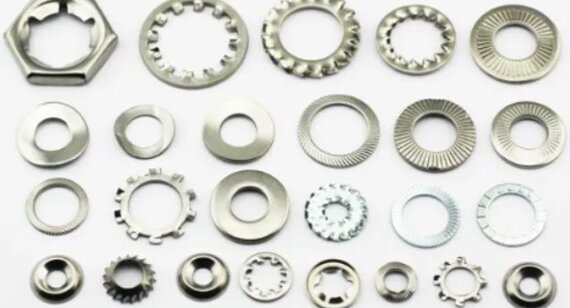
What is a Washer?
A washer is a small but essential part of mechanical assemblies. It is a thin, flat plate with a hole in the center that fits around a screw, bolt, or nut. Washers help fasteners connect surfaces more effectively. They spread out the force from tightening, reduce wear, and keep joints secure over time.
Most washers are round, with a smooth or shaped surface and a hole that matches the screw or bolt they support. The most common type is the flat washer, which spreads force evenly across a surface.
Other types, like spring washers or lock washers, add grip and prevent loosening. Some washers also act as spacers, seals, or electrical insulators, depending on their design and material. They come in a variety of sizes, thicknesses, and materials to suit different assembly needs.
Purpose of a Washer
Washers play several roles in fastening systems. They do more than just sit between a screw and a surface. Each role adds strength, safety, and durability to an assembly.
Spacing and Alignment
Washers act as spacers when parts need small gaps to fit correctly. They also help align screws or bolts in holes that may be slightly oversized or uneven, keeping the assembly straight and stable.
Load Distribution
When a screw or bolt is tightened, the pressure focuses on one small area. A washer spreads that pressure over a larger surface, preventing parts from cracking, bending, or deforming under stress.
Seal and Liquid Protection
Some washers create a seal between surfaces. Rubber or nylon washers can block water, dust, or air from getting through gaps. They are often used in plumbing, outdoor equipment, and electronics.
Vibration Absorption
Machines and vehicles often produce vibrations that loosen fasteners over time. Special washers, such as spring or wave types, absorb these vibrations and keep screws tight. This improves safety and reduces maintenance.
Damage Prevention
Fasteners tightened directly against a surface can cause scratches or wear. Washers add a protective layer that prevents marks and dents. This is especially helpful for softer metals and finished surfaces.
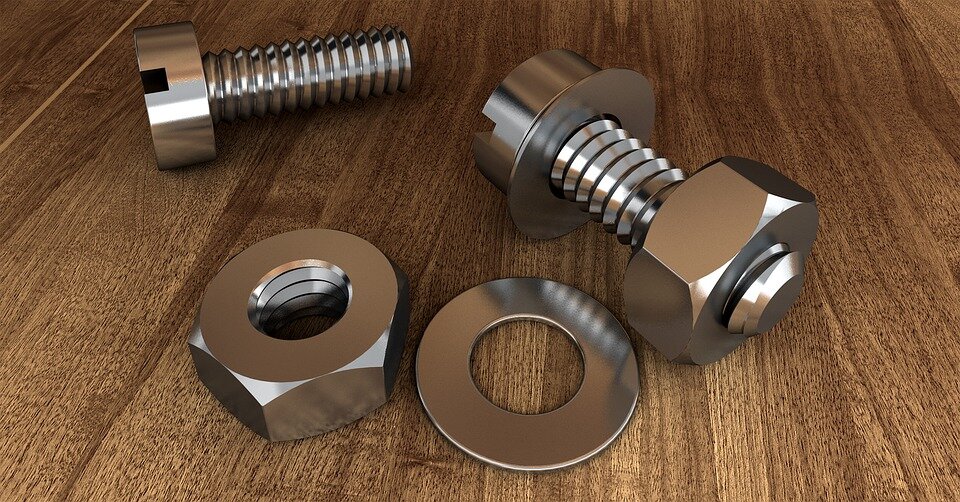
Different Types of Washers
Washers come in many shapes and designs. Each type solves a specific problem in fastening systems. Choosing the right washer improves performance, prevents failure, and extends product life.
Plain Washers
Plain washers are the most common type. They are flat, thin plates placed under nuts or bolt heads. Their main job is to spread the load and protect surfaces.
Torque Washer
Torque washers have serrations or square holes that grip into wood or soft metal. They stop the fastener from turning and are often used in furniture or light construction.
Flat Washer
Flat washers are simple, round plates with a hole in the center. They spread the load evenly, reduce wear, and protect surfaces from damage. They are widely used in everyday applications.
Fender Washer
Fender washers have a much larger outside diameter compared to the hole size. They spread force across a wide area, making them ideal for thin sheet metal or softer materials.
Finishing or Countersunk Washer
These washers have a beveled shape to match countersunk screws. They provide a neat look while letting the screw head sit flush with the surface. They are often used in furniture and decorative projects.
Shoulder Washer
Shoulder washers are made from insulating materials like nylon or plastic. They provide both spacing and electrical insulation. They are common in electronics and circuit assemblies.
C-washer
C-washers have an open slot shaped like the letter “C.” This design allows them to slide in and out of place without removing the screw or bolt, making them useful for quick adjustments.
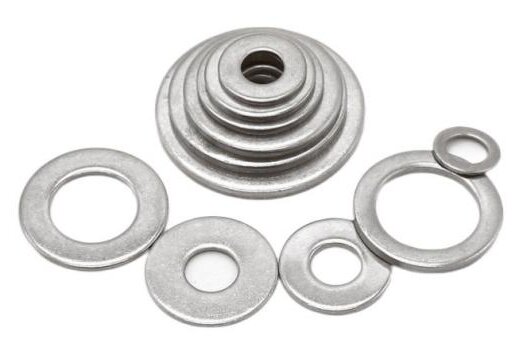
Spring Washers
Spring washers apply tension to maintain tightness. They resist loosening caused by vibration, movement, or temperature changes.
Belleville or Conical Washer
These washers have a conical shape. They deliver a strong spring force in a compact space, and they are common in heavy machinery and high-load applications.
Dome Spring Washer
Dome washers, shaped like shallow cups, absorb shock and vibration. They maintain tension in assemblies where flexibility is needed.
Wave Spring Washer
Wave washers have a wavy profile that compresses under load. They provide light spring pressure and work well in small assemblies or tight spaces.
Finger Spring Washer
Finger washers have flexible tabs or “fingers” that create a cushioning effect. They reduce vibration and distribute load more evenly than flat washers.
Crescent Spring Washer
These washers are curved like a crescent. Their shape gives them spring properties, helping resist loosening and maintain clamping force.
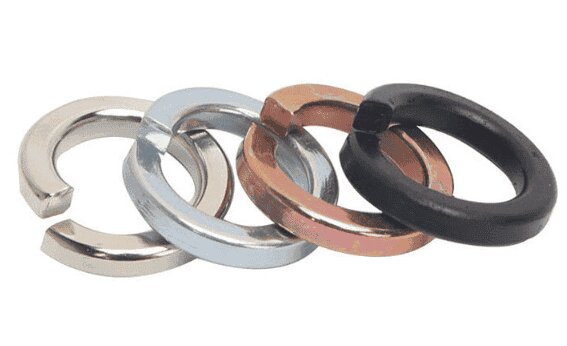
Lock Washers
Lock washers prevent nuts and bolts from loosening under vibration and stress.
Split Lock Washer
Split lock washers are cut and slightly twisted. When tightened, they create spring tension that prevents the fastener from backing out.
External Tooth Lock Washer
This washer has teeth on the outer edge. The teeth bite into the surface to stop loosening. They work well with larger fastener heads.
Internal Tooth Lock Washer
These washers have teeth on the inner edge around the hole. They grip the shaft of the screw or bolt, giving a firm hold in smaller or hidden spaces.
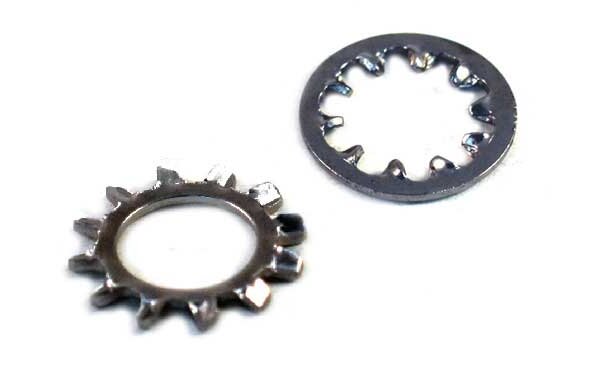
Specialized Washers
Specialized washers meet unique needs in electronics, plumbing, or structural work.
Keps Nut
A keps nut, also called a captive washer nut, has a lock washer built in. It saves assembly time and adds vibration resistance.
Top Hat Washers
These washers have a raised, hat-like shape. They provide insulation and spacing in electronic or mechanical assemblies.
Keyed Washers
Keyed washers have a small tab or key that fits into a slot on a shaft. This stops rotation and keeps parts aligned.
Insulating Shoulder Washer
These washers separate metal parts to prevent electrical contact. They are widely used in circuit boards and power equipment.
Gaskets
While not always grouped with washers, gaskets serve a similar role. They seal joints against fluids, gases, or contaminants. Gaskets are common in plumbing, engines, and pipelines.
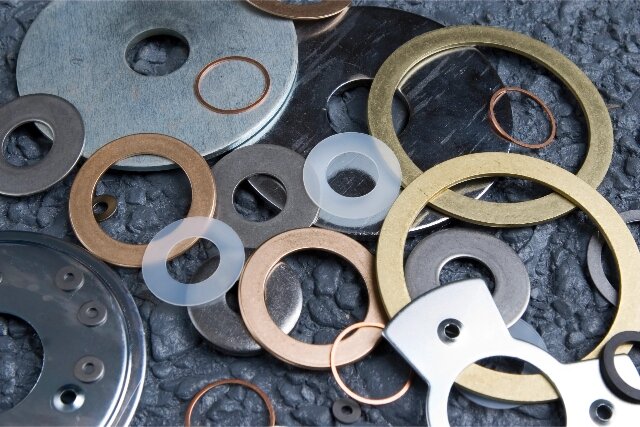
Materials for Washers
Washers are made from different materials to meet specific performance needs. The choice of material affects strength, flexibility, wear resistance, and protection against environmental factors. Each type works best in certain applications.
Rubber and Nylon Washers
Rubber washers are flexible and compressible. They create tight seals that block water, air, or dust, making them common in plumbing, outdoor equipment, and automotive parts.
Their ability to absorb shock also reduces vibration and noise. Nylon washers, on the other hand, are lightweight, non-conductive, and resistant to corrosion. They provide electrical insulation and protect delicate surfaces from scratches. They are widely used in electronics, appliances, and assemblies where metal contact must be avoided.
Metal Washers
Metal washers are strong and durable. Common materials include steel, stainless steel, brass, copper, and aluminum. Steel washers provide strength for heavy-duty fastening. Stainless steel resists rust and works well outdoors or in marine environments.
Brass and copper offer good conductivity and corrosion resistance, making them useful in electrical and plumbing systems. Aluminum is lightweight and often chosen for aerospace and automotive assemblies.
Plastic Washers
Plastic washers are light, resistant to many chemicals, and cost-effective. They are not as strong as metal, but they provide insulation and resist corrosion.
They are common in low-load applications where chemical resistance or electrical insulation is needed. Electronics, medical devices, and consumer products often rely on them for safe and reliable fastening.
How to Choose the Right Washer?
Choosing the right washer depends on the application’s needs. The type, size, and material of the washer affect how well the fastener works. Careful selection improves reliability, safety, and service life.
Load and Pressure Requirements
First, think about the load the washer must handle. Heavy loads need strong metal washers that spread force without bending. Light loads can use plastic or nylon washers, which provide spacing or insulation.
Spring and lock washers are better for assemblies exposed to vibration or movement. Matching washer strength to the pressure applied keeps the connection secure.
Material Compatibility
The washer material should match or complement the fastener and the parts being joined. Stainless steel washers pair well with stainless fasteners in outdoor use, while brass or copper washers work in plumbing systems where corrosion resistance is needed.
Nylon or rubber washers are better for delicate surfaces or when electrical insulation is required. Using mismatched materials can cause wear, corrosion, or early failure.
Environmental Conditions
Washers often face harsh conditions such as moisture, heat, or chemicals. Stainless steel resists rust in outdoor or marine environments, while rubber washers are effective for sealing against water or dust.
Nylon and plastic washers are suitable for electronics where insulation is important, but may not handle high heat. Choosing with the environment in mind ensures durability and reduces repair costs.
Conclusion
Washers may seem simple, but they are vital in fastening systems. They spread loads, prevent surface damage, reduce vibration, and provide sealing or insulation. With types such as plain, spring, lock, and specialized, each design meets different needs.
If you need reliable washer solutions for your next project, contact us today for expert support and a quick quote.
Hey, I'm Kevin Lee

For the past 10 years, I’ve been immersed in various forms of sheet metal fabrication, sharing cool insights here from my experiences across diverse workshops.
Get in touch

Kevin Lee
I have over ten years of professional experience in sheet metal fabrication, specializing in laser cutting, bending, welding, and surface treatment techniques. As the Technical Director at Shengen, I am committed to solving complex manufacturing challenges and driving innovation and quality in each project.

